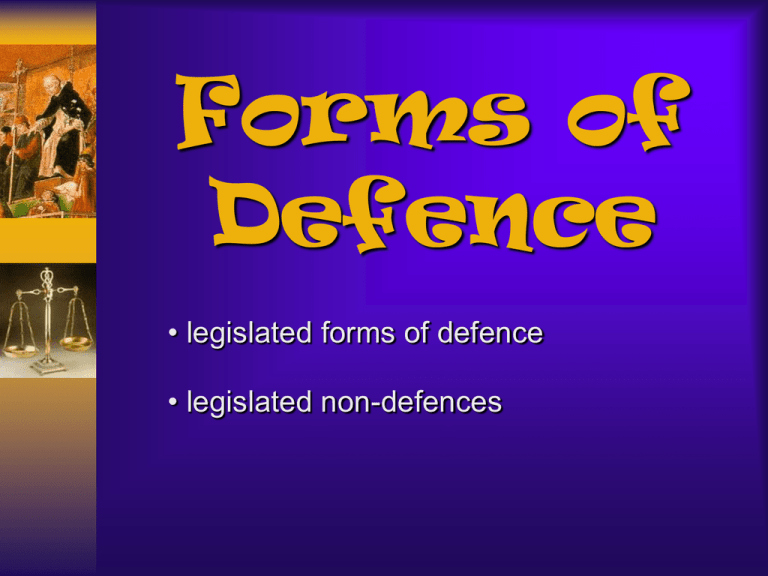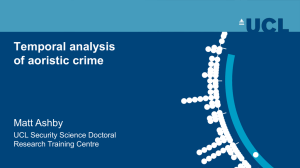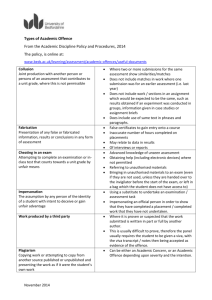
Forms of
Defence
• legislated forms of defence
• legislated non-defences
Legislated Forms of Defence
Under the Criminal Code
Child under twelve, S. 13
Obedience to de facto law, S. 15
Defence of mental disorder, S. 16
Compulsion by threats, S. 17
Self-defence, S. 34
Child under twelve (Section 13)
No person shall be convicted of an offence in respect of
an act or omission on his part while that person was
under the age of twelve years.
Obedience to de facto law (Section 15)
No person shall be convicted of an offence in respect of
an act or omission in obedience to the laws for the time
being made and enforced by persons in de facto
possession of the sovereign power in and over the place
where the act or omission occurs.
Defence of mental disorder (Section 16)
No person is criminally responsible for an act committed
or an omission made while suffering from a mental
disorder that rendered the person incapable of
appreciating the nature and quality of the act or omission
or of knowing that it was wrong.
(2) Every person is presumed not to suffer from a mental
disorder so as to be exempt from criminal responsibility
by virtue of subsection (1), until the contrary is proved on
the balance of probabilities.
(3) The burden of proof that an accused was suffering
from a mental disorder so as to be exempt from criminal
responsibility is on the party that raises the issue.
'Shania Twain' defence works in drunk driver's favour
Last Updated Tue, 28 Mar 2006 08:47:03 EST
CBC News
One of the most notorious drunk drivers in the Ottawa
area has been found not criminally responsible on his
latest impaired driving charges because of a mental
disorder that makes him believe female celebrities are
controlling his actions. Matt Brownlee was arrested last
October after police spotted a pickup truck speeding
along a busy street in downtown Ottawa.
The 33-year-old man told psychiatrists that he knew the
legal repercussions of his actions, but believed singer
Shania Twain was helping him drive. Brownlee pleaded not
guilty to four charges, including impaired operation of a
motor vehicle and driving while disqualified. On Monday,
the judge drew on several psychiatric assessments in ruling
that Brownlee was not criminally responsible for his actions
because he suffers from delusions that celebrities such as
Twain are communicating with him telepathically.
Matt Brownlee believed singer
Shania Twain was helping him
drive. (AP file Photo)
Ten years ago, Brownlee was given a seven-year prison sentence and banned
from driving for the rest of his life after he killed an Ottawa woman, Linda
Lebreton-Holmes, and her 12-year-old son while driving with a blood alcohol
level three times the legal limit. Earlier in March, a psychiatrist told the court
that Brownlee suffers from psychosis and mood disorders resulting from a brain
injury caused by the 1996 car crash.
Brownlee has been undergoing a series of assessments at the Brockville
Psychiatric Hospital since last fall. Another assessment of how much risk he
poses to the community could see Brownlee being detained in hospital, released
under supervision in the community, or given an absolute discharge.
Father showed no signs of mental disorder: doctor
Last Updated: Sep 19 2003 07:36 AM
PDT CAMPBELL RIVER, B.C. - The family doctor who treated a Quatsino man says
he was distressed but not psychotic, after he killed his six children last March.
That's contrary to Jay Handel's defence. The 46-year-old dad says he is not guilty of
six counts of murder because he was mentally ill.
The Crown is trying to prove the killings were an act of revenge, while the defence
lawyer maintains client is legally insane.
Dr. Marlene Smith was the Handel family physician. She delivered several of the
children – and she took care of both Jay Handel and his estranged wife Sonya
right after the killings. Dr. Smith testified she received a letter from Jay Handel
that he'd written just hours after he killed his three boys and three girls – who
ranged in age from two to 11. In it, Handel tells her the children died peacefully.
Smith followed up with a phone call to Handel who was in a psychiatric ward at
the time. "I asked him what he did to the children," she says. "He told me he gave
them codeine. I said that wouldn't have killed them. And he replied that it didn't
matter what he'd done. They're dead now."
Smith also asked him why he killed his children. She says he told her Sonya
wanted to be alone, and now she was. She said he became distressed only after
she told him that Sonya's estranged family had rallied around her in the aftermath
of the deaths, and that they were planning a memorial. Smith said she believed
Handel was upset because he thought he should be at the service, and that he
didn't intend for Sonya's family to come together over the tragedy.
Compulsion by threats (Section 17)
A person who commits an offence under compulsion by
threats of immediate death or bodily harm from a person
who is present when the offence is committed is excused
for committing the offence if the person believes that the
threats will be carried out and if the person is not a party
to a conspiracy or association whereby the person is
subject to compulsion, but this section does not apply
where the offence that is committed is:
high treason or treason, murder, piracy, attempted murder, sexual assault,
sexual assault with a weapon, threats to a third party or causing bodily
harm, aggravated sexual assault, forcible abduction, hostage taking,
robbery, assault with a weapon or causing bodily harm, aggravated assault,
unlawfully causing bodily harm, arson or an offence under sections 280 to
283 (abduction and detention of young persons)
Defence of Person (aka Self-defence) (Section 34)
34. (1) Every one who is unlawfully assaulted without
having provoked the assault is justified in repelling force
by force if the force he uses is not intended to cause
death or grievous bodily harm and is no more than is
necessary to enable him to defend himself.
(2) Every one who is unlawfully assaulted and who
causes death or grievous bodily harm in repelling the
assault is justified if:
(a) he causes it under reasonable apprehension of
death or grievous bodily harm from the violence with
which the assault was originally made or with which
the assailant pursues his purposes; and
(b) he believes, on reasonable grounds, that he
cannot otherwise preserve himself from death or
grievous bodily harm.
Legislated Non-Defences
Under the Criminal Code
Consent to death, S. 14
Compulsion of spouse, S. 18
Ignorance of the law, S. 19
Self-Induced Intoxication, S. 33
Consent to death (Section 14)
No person is entitled to consent to have death inflicted
on him, and such consent does not affect the criminal
responsibility of any person by whom death may be
inflicted on the person by whom consent is given.
Compulsion of spouse (Section 18)
No presumption arises that a married person who
commits an offence does so under compulsion by reason
only that the offence is committed in the presence of the
spouse of that married person.
Ignorance of the law (Section 19)
Ignorance of the law by a person who commits an
offence is not an excuse for committing that offence.
Self-induced intoxication (Section 33)
33.1 (1) It is not a defence to an offence referred to in subsection (3)
that the accused, by reason of self-induced intoxication, lacked the
general intent or the voluntariness required to commit the offence,
where the accused departed markedly from the standard of care as
described in subsection (2).
(2) For the purposes of this section, a person departs markedly from
the standard of reasonable care generally recognized in Canadian
society and is thereby criminally at fault where the person, while in a
state of self-induced intoxication that renders the person unaware of,
or incapable of consciously controlling, their behaviour, voluntarily or
involuntarily interferes or threatens to interfere with the bodily
integrity of another person.
(3) This section applies in respect of an offence under this Act or any
other Act of Parliament that includes as an element an assault or any
other interference or threat of interference by a person with the
bodily integrity of another person.
'Stoned defence' thrown out by court
Last Updated Wed, 14 Mar 2001 12:10:14 EST CBC News
YELLOWKNIFE, N.W.T. - The N.W.T. Court of Appeal has overturned
a sexual assault acquittal that outraged women's groups in the
territory.
James Kenneth Brenton was acquitted in 1999 because he said he
was 'too stoned' to know what he was doing. Brenton's lawyer argued
that it was unconstitutional for his client not to be able to use that
argument as defence.
The Criminal Code forbids people from arguing they had no intent to
commit a crime because of extreme intoxication.
The trial judge found Brenton guilty, but an appeal court agreed with
the arguments, and acquitted him.
Now the Court of Appeal of the Northwest Territories has ruled
constitutional arguments are irrelevant in this case. Brenton's
convictions now stand.
Brenton was originally sentenced to 14 months in jail. He can still
appeal the length of his sentence, but there's no word if that will
happen.
Copyright ©2005 Canadian Broadcasting Corporation - All Rights Reserved
Role Plays
Group
Forms of Defence
A
•automatism,
•mental disorder, and
•intoxication
B
•mistake of law:
•colour of right
•officially induced mistake of law
•mistake of fact
C
•self-defence,
•compulsion (duress).






